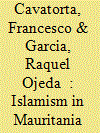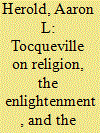| Srl | Item |
| 1 |
ID:
154242


|
|
|
|
|
| Summary/Abstract |
The rise of Islamism following the Arab Spring has renewed interest in the democratic credibility of Islamist parties and movements. Focusing on the case of Mauritania's Islamists this article analyses the validity of the moderation hypothesis and argues that for some Islamist parties, moderation, when historically situated, has always been a key trait. The case of Mauritanian Islamism is interesting because it takes place within an intellectual and geographical place that straddles both the Arab world and sub-Saharan Africa, therefore providing insights on how Islamism has become an influential ideological framework in both worlds, that are much less separate than superficially believed.
|
|
|
|
|
|
|
|
|
|
|
|
|
|
|
|
| 2 |
ID:
103209


|
|
|
|
|
| Publication |
2011.
|
| Summary/Abstract |
The article investigates a critical case from the Bosnian war: the city of Tuzla, whose local government managed both to survive politically in the 1992-1995 war and to maintain its non-nationalist politics. In wartime, new political structures, legacies of the past, pre-existing institutions and networks, resources, and creative policymaking were used both for fostering and for defusing conflict. The article demonstrates that political moderation was difficult to accomplish and sustain, but it proved to be possible. The interplay of elite and grassroots agency reconstituted the political opportunity structure and policymaking was geared towards moderate politics that served to defeat powerful radical nationalist opponents.
|
|
|
|
|
|
|
|
|
|
|
|
|
|
|
|
| 3 |
ID:
140809


|
|
|
|
|
| Summary/Abstract |
This article proposes a new interpretation of Tocqueville's thought, one that focuses on his account of religious psychology. From his observations of America, Tocqueville concludes that human beings have a natural hope for immortality—a hope that is driven by a paradoxical but ineradicable desire to affirm and forget oneself simultaneously. Tocqueville formulates this insight as a critique of the Enlightenment thinkers who laid the foundations for liberal democracy; I argue that he crafts his “new political science” to provide healthy outlets for the religious hopes whose existence these thinkers largely denied and whose anomalous presence in the United States has accordingly led to unforeseen dangers. Tocqueville's analysis not only helps us understand and begin to remedy those dissatisfactions that characterize democracy today but it also reveals his theoretical depth, political moderation, and sober assessment of our moral psychology in a way not seen before.
|
|
|
|
|
|
|
|
|
|
|
|
|
|
|
|